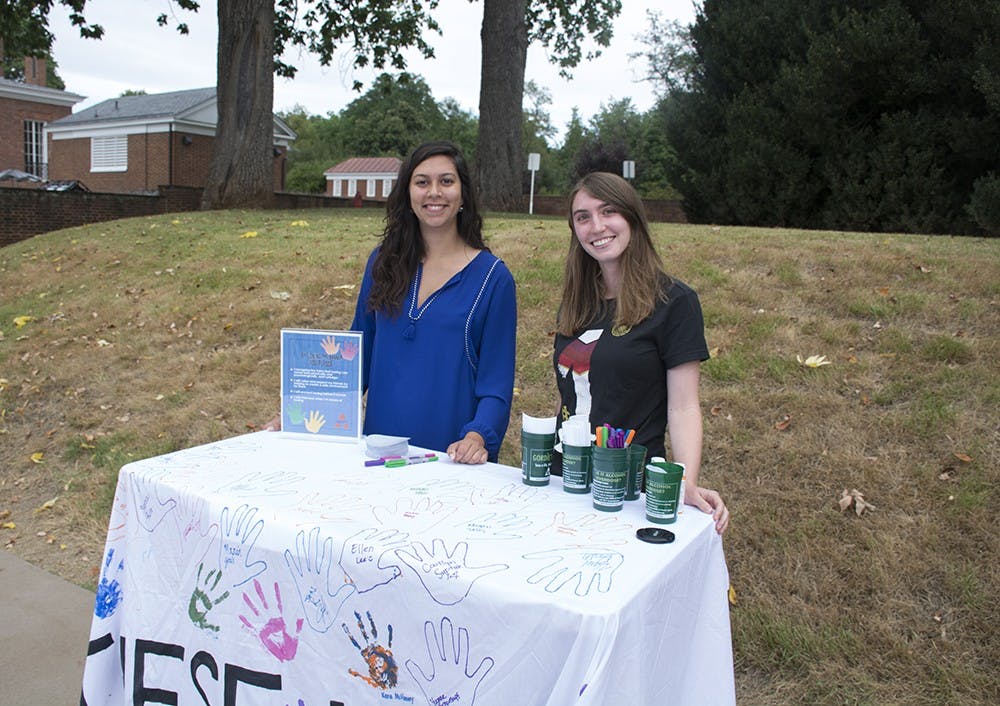University students engaged in Hazing Prevention Week — spanning Sept. 19-23 — aiming to bring to light the harmful behavior of hazing. The U.Va. Alcohol and Drug Abuse Prevention Team campaign, entitled “These Hands Don’t Haze,” gave students the opportunity to pledge their support throughout the week.
Hazing is “any activity that is expected or required of someone to join or maintain status within a group that humiliates, degrades or risks emotional and/or physical harm, regardless of the person’s willingness to participate,” according to the Hoos Against Hazing website. Anything matching this description is considered a crime and prohibited by the University Standards of Conduct.
While on the surface hazing may not seem to impact the average student, the National Study of Student Hazing from the University of Maine found that 47 percent of students experience hazing before even entering college. Hazing Prevention Week sought to bring light to the issue.
“The purpose is to really raise awareness of what hazing is and to take a stand against it,” Gordie Center Director Susan Bruce said. “[We had students] sign the pledge and trace their hand.”
In signing the pledge, students promised to "recognize the harm that hazing can cause both physically and psychologically” and work to “prevent hazing before it occurs.” ADAPT partnered with the Inter-Sorority Council to table throughout the week.
Along with signing the pledge, students could participate in a social media contest. To enter, students posted photos of themselves or an organization that promotes a positive image against hazing.
“We’re trying to have a positive message to leaders of organizations and what are the things you’re doing [to prevent hazing],” Bruce said.
To further combat hazing, the Office of the Dean of Students is launching a new program entitled Positive Organization Expectations. Through the program, peer facilitators can lead student organizations through an open discussion about the values of their organization and the impact of hazing on students.
“The purpose of the Positive Organization Expectations Program is to bring groups together — this could be teams, CIOs, fraternities and sororities — or other groups in a safe, open-minded environment to start a conversation about the values within these groups,” Prevention Program Coordinator Rachel Kiliany said.
While the program has yet to begin, ODOS is in the process of recruiting and selecting peer facilitators to lead these conversations. Moving forward, there will be two facilitator training sessions, in which participants will learn basic facilitation and public speaking skills, as well as learn the topic of hazing, hazing behaviors, psychological theories about hazing and how to access support resources.
“We are hoping that the program sparks more conversation about what being an inclusive and supportive organization looks like and how hazing can impact that,” Kiliany said.
During the week, several student organizations have taken a stance against hazing. Third-year College student and Theta Nu Xi Multicultural Sorority member Briana Barrett pledged her support.
While hazing is most often associated with Greek organizations, hazing can occur in other clubs and organizations, and within high schools as well, Barrett said. Her sorority has taken a stand against hazing.
“Theta Nu Xi Multicultural Sorority, Inc. is a non-hazing organization, and we support National Hazing Prevention Week because we do not stand for this demeaning and potentially life-threatening behavior enacted on people,” Barrett said. “Our sisterhood is centered around accepting people for who they are and helping them to experience life as they want to experience it.”
While Hazing Prevention Week has come to an end, those at the Gordie Center for Substance Abuse Prevention and ADAPT intend to continue their fight against harmful behaviors.
“[The banner] will be hung in the Amphitheatre in the spring as recruitment begins for organizations,” Bruce said. “[Hazing prevention] is not just one week, it really has to be ongoing.”







